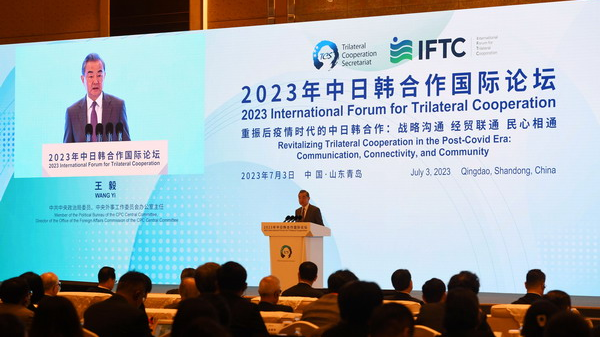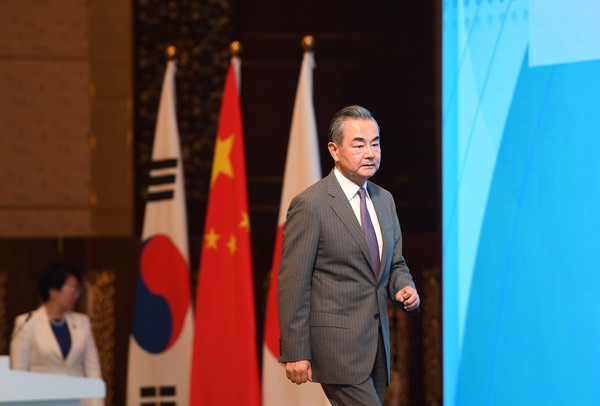Senior Chinese diplomat Wang Yi on Monday called for joint efforts to protect, promote and achieve Asia's peace, prosperity and revitalization.
Wang, director of the Office of the Foreign Affairs Commission of the Communist Party of China (CPC) Central Committee and a member of the Political Bureau of the CPC Central Committee, made the remarks when addressing the opening ceremony of the 2023 International Forum for Trilateral Cooperation, an annual forum between China, Japan and South Korea, in Qingdao, east China's Shandong Province.
Wang called on China, Japan and South Korea to uphold mutual respect, openness, inclusiveness and independence to achieve harmony, solidarity and self-improvement, aiming to firmly safeguard the correct direction of cooperation among the three countries.

Senior Chinese diplomat Wang Yi addresses the opening ceremony of the 2023 International Forum for Trilateral Cooperation in Qingdao, east China's Shandong Province, July 3, 2023. /Chinese Foreign Ministry
Senior Chinese diplomat Wang Yi addresses the opening ceremony of the 2023 International Forum for Trilateral Cooperation in Qingdao, east China's Shandong Province, July 3, 2023. /Chinese Foreign Ministry
The first joint declaration issued by the three countries 20 years ago pointed out that trilateral cooperation aims to promote development, strengthen cooperation in East Asia, as well as maintain regional and world peace and prosperity, which is the original aspiration of trilateral cooperation, and the mission of the three countries, Wang said.
He added that trilateral cooperation over the past two decades has grown to be the most influential sub-regional cooperation mechanism in Asia, providing important impetus for moving towards modernization of the three countries and Asia.
In order to seek geopolitical gain, certain countries outside the region in recent years deliberately exaggerated ideological differences and wantonly created exclusive circles, attempting to replace cooperation and unity with confrontation and division, Wang said, warning that the promotion of trilateral cooperation will be disturbed and tensions in the region will be exacerbated if this trend is allowed to develop.
"Asia is our common home," Wang said, calling on all countries in Asia to practice open regionalism, cultivate a sense of strategic autonomy, safeguard regional unity and stability, free from bullying, and resist the return of the Cold War mentality.
The world is undergoing profound changes unseen in a century, and Asia is at an important juncture from tradition to modernity, Wang noted.
Noting that China, Japan and South Korea are all important economies in the world, with a combined population accounting for one fifth of the world's total and a combined GDP exceeding one quarter of the world's total, Wang called for joint protection, promotion and efforts for Asia's peace, prosperity and revitalization.
To that end, Wang put forward five proposals.

Wang Yi attends the opening ceremony of the 2023 International Forum for Trilateral Cooperation in Qingdao, July 3, 2023. /Chinese Foreign Ministry
Wang Yi attends the opening ceremony of the 2023 International Forum for Trilateral Cooperation in Qingdao, July 3, 2023. /Chinese Foreign Ministry
First, mutual trust should be strengthened to maintain regional peace and stability.
Wang called for adhering to the concept of common, comprehensive, cooperative and sustainable security, upholding the national sovereignty and territorial integrity of all countries, paying attention to the legitimate security concerns of all countries, and resolving differences and disputes peacefully through dialogue and consultations.
Regarding major issues of principle involving the foundation of bilateral relations, such as history and the Taiwan question, Wang said the principles of the four China-Japan political documents and the joint communique on the establishment of diplomatic relations between China and South Korea should be abided by.
Second, mutual benefits should be enhanced to create momentum for economic growth.
Wang urged efforts to continuously advance the new cooperation mode of "China-Japan-South Korea+X," explore joint projects in fields such as production capacity, poverty reduction, health, disaster management to allow trilateral cooperation to benefit other countries and regions.
Third, interconnectivity should be strengthened to jointly promote regional economic integration.
It is necessary to accelerate the negotiation of the China-Japan-South Korea free trade area to further improve the level of trade liberalization and facilitation, he said, calling for implementing the Regional Comprehensive Economic Partnership (RCEP) to promote the integration of regional economies.
Fourth, mutual assistance should be enhanced to address common challenges, he added.
Regarding areas such as sand control, ocean governance, immigration management and combating transnational crimes, Wang urged carrying out information communication, experience exchange and policy coordination.
Noting that the discharge of nuclear-contaminated water into the sea is related to the safety of marine ecology and people, he said in-depth coordination with neighboring countries and the international community must be carried out.
Fifth, exchanges and mutual learning should be enhanced to cultivate the foundation of social public opinion, he said.
Wang encouraged interaction among media, think tanks and civic groups, especially young generations, adding that the media of the three countries have the responsibility to create a sound environment for promoting sincere and friendly mutual understanding among the three peoples.
Prior to the opening ceremony, Wang met with the main guests participating in the forum, saying that the three countries should work together to activate the trilateral cooperation and exchange mechanism, aiming to revitalize Asia and benefit the world.
The forum was organized by the Trilateral Cooperation Secretariat, a Seoul-based international body for promoting peace and common prosperity among the three countries, and is held in Qingdao, east China's Shandong Province, this year.